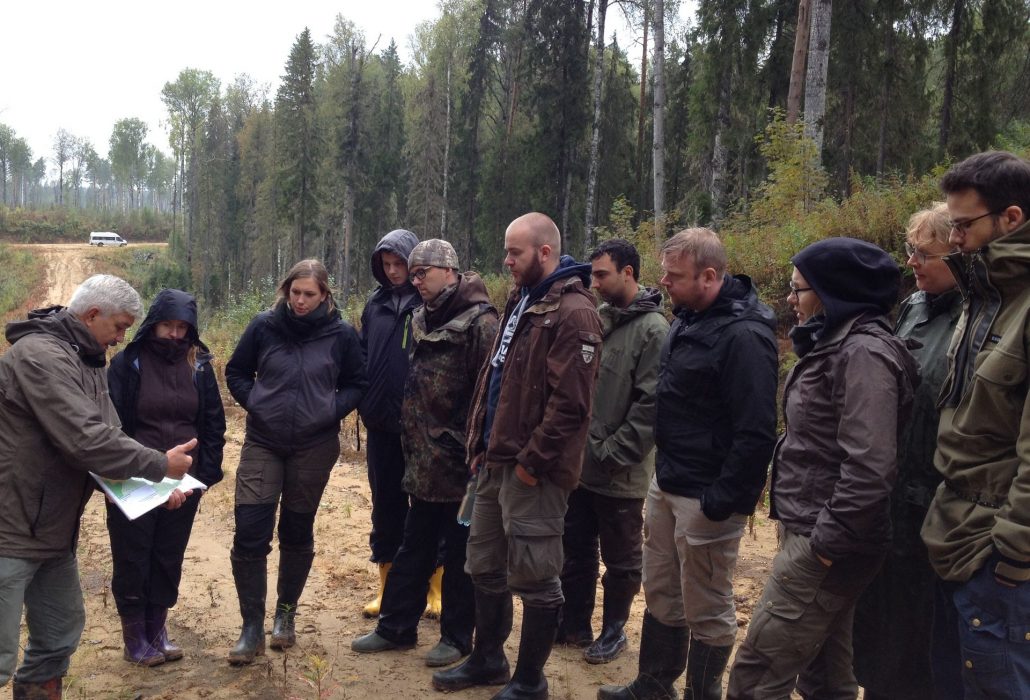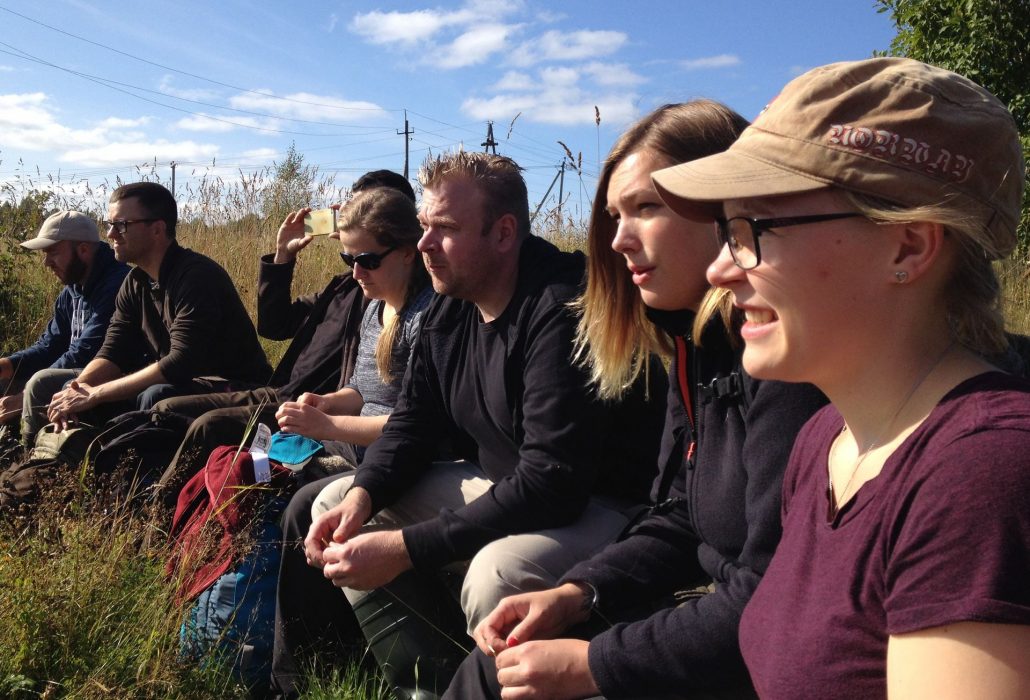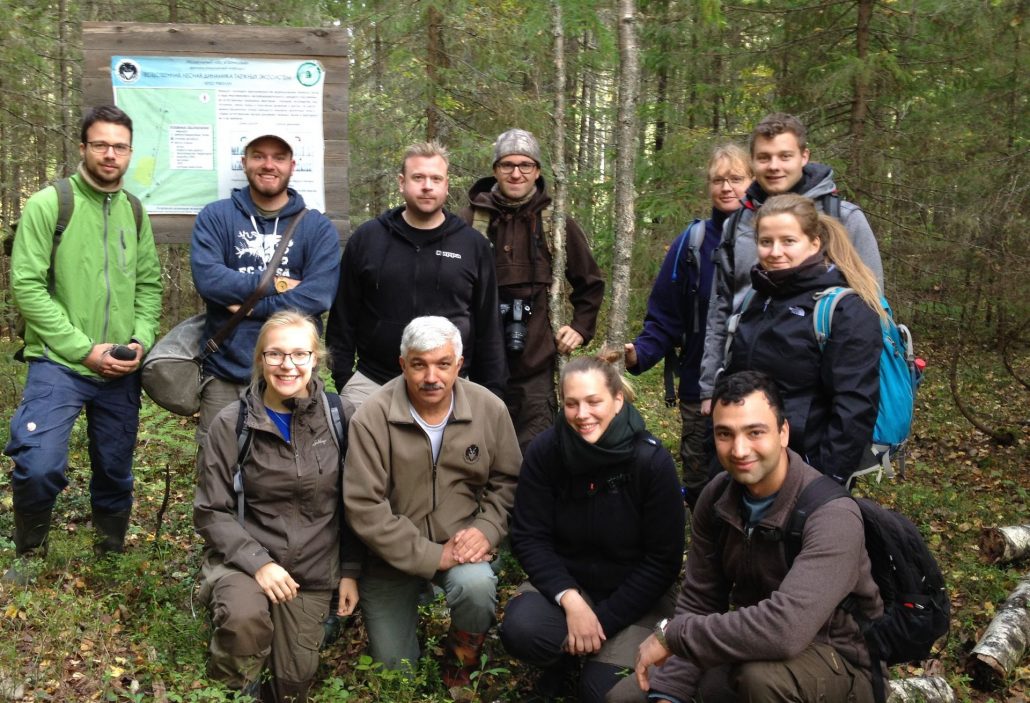Global Climate Change and Clear Felling Scale Discussed at International Forest Summer School in Komi
Regular studies of the International Forest Summer School facilitated by Syktyvkar Forest Institute and arranged jointly with its partners, Silver Taiga, Mondi Syktyvkar, and Komi Fire Fighting Center, were held from 3 to 16 September in Komi. The annual course was attended by students of foreign universities.
For several years experts of the Silver Taiga Foundation for Sustainable Development have participated in the event through sharing their experience and the results of the Priluzye Model Forest project, as well as a number of other projects. This time, the course has been attended by nine forestry students from three different German universities and one student from Sweden. On the second day, a lecture on forestry specifics in Russia and Komi and regularities of natural taiga forest dynamics was given by Yury Pautov, director of the Silver Taiga Foundation. Germany is dominated by temperate zone forests, mostly deciduous, so it was necessary for the German students to get acquainted with the character of forest management in the Northern taiga.
On the following days, during field studies, the visitors walked along the three demonstration routes of the Priluzye Model Forest, a logging camp of the Luzales company, and an operating logging site of Mondi Syktyvkar in the Noshul district forestry. The future forest engineers were eager to learn about functioning of forestry sector in Russia, differences between the forest management rules in Russia and European countries, compare forest exploitation history in different countries. They were particularly impressed by the size of clear felling area in Komi. The maximum clear felling area in Germany should not exceed three hectares, and even such size is rare. Germans, as a rule, prefer selection felling. So, the visitors were interested in the biodiversity preservation system applied in certified forests.
The foreign students were much surprised about the fact that local people sell mushrooms and berries by the roads near residential areas. People do not do it in Germany. They also found themselves lucky to see traces of wild animals – a she-bear with bear cubs and a couple of wolves. It turned out that wolves are protected by the state in Germany, and they can only be hunted under a license in specially allocated areas. The foreign guests found it exotic that bears in Komi hang out by highways hoping to be fed, and wolves come to villages in winter and scare the locals, as was told by Yury Pautov.
Daily taiga management practices were presented at the meeting with Yury Serditov, deputy head of the Priluzye forestry. He told the students about the effective forestry legislation and the features of the Russian forest management system. The German students were surprised about the fact that foresters in Russia are no more than just state inspectors, while in Germany they are fully responsible for all the activities conducted within the forestry, including wood cutting and hunting. The German visitors also noted that forest fires in Germany are extraordinary events, because the temperate zone forests are dominated by hardwood species – beech, oak, ash. So, they had a lot of questions with regard to the dynamics and consequences of fires. They were also interested in the methods currently used in Komi for fire fighting and fire prevention.
“Such international forest summer schools are very useful both for students, and for trainers, because they allow seeing forest as a global worldwide resource necessary to ensure survival of the mankind. In particular, discussions with the students from Germany revealed the different approaches to climate change in different countries. Few people focus on the issue in Russia now. At a meeting in Priluzye forestry the students asked what norms for adjustment to climate change are used in Komi forest sector??? Neither myself, nor deputy head of the forestry could clearly answer the question, because Russia simply has no such norms. Climate change takes place globally and locally, and that is clear from more frequent extreme weather conditions, like hurricanes, winter thaw, droughts, floods. A good example was last summer, when Northern districts of Komi suffered of uncommon heat, there were forest fires in forest taiga, while Southern districts were flooded by continuous rain. Such extreme weather conditions undoubtedly lead to weakening of forests, which results in outbreak of parasites propagation and forest diseases. Many foreign countries have already developed measures for forestry adaptation to upcoming climatic changes, but in Russia only scientists and few experts speak about the necessity of such measures,” Yury Pautov summed up the course.





